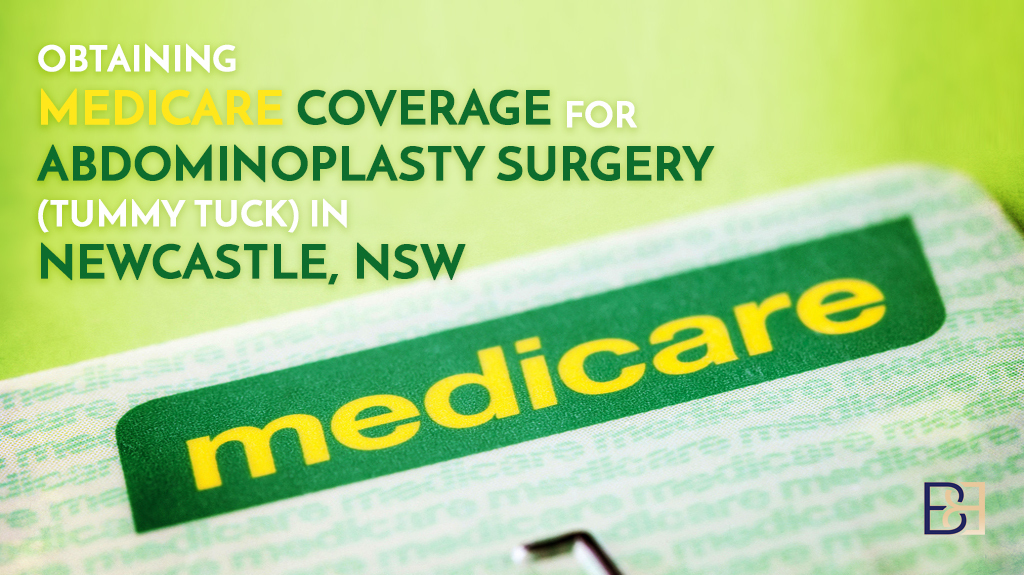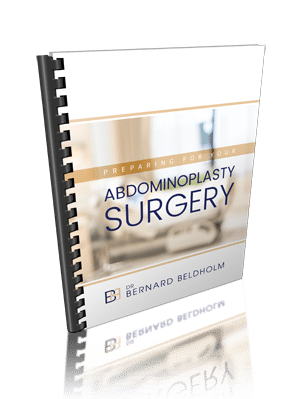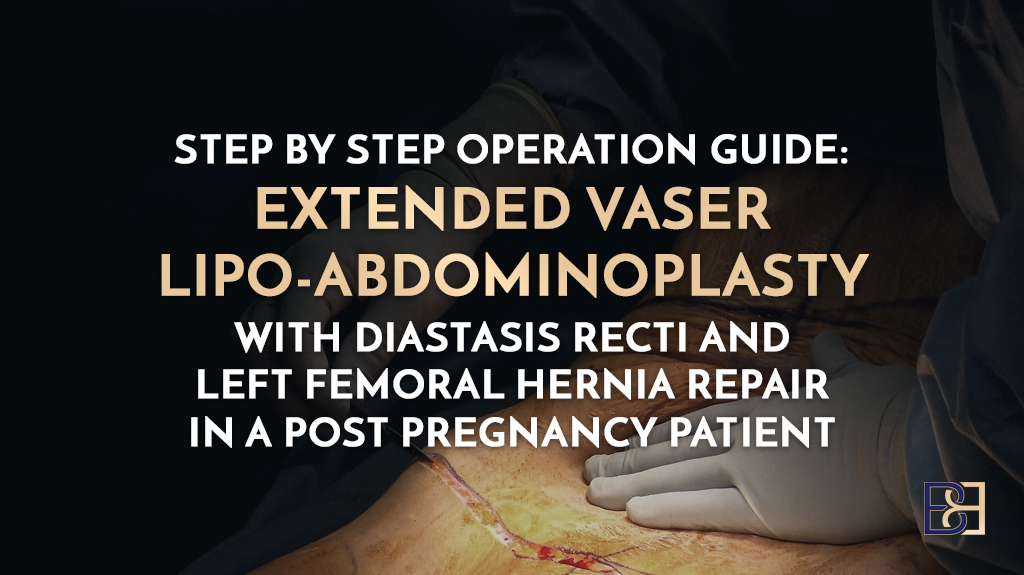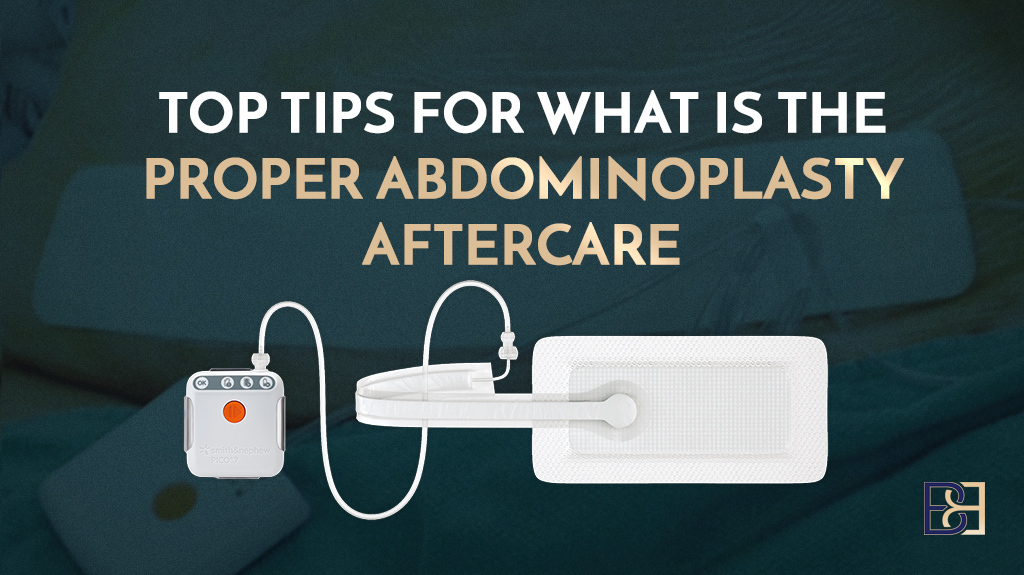Medicare will cover your abdominoplasty surgery if it is deemed medically necessary. If you meet the specified criteria, such as if the excess skin and fat are affecting your work and daily life, you may qualify for a Medicare Benefits Schedule (MBS) Item Number.
Medicare is a health insurance benefit offered to citizens and permanent residents by the Australian government. Most of my patients take advantage of the Medicare Benefits Schedule to reduce their surgery fees.
You are no exception. I invite you to visit our offices, where we’ll discuss this rebate program in depth and how it may benefit you. Let me briefly guide you on what to expect during our conversation.

Book your appointment online now
Types Of Abdominoplasty Surgeries That Qualify for An MBS Item Number
I will categorise all abdominoplasty procedures that qualify for two types of Item Numbers;
Post-pregnancy surgeries with muscle separation and other symptoms
Post-weight loss procedures with excess skin and fat caused by shedding more than five BMI points and maintaining stable weight for a minimum of six months
I must mention that abdominoplasty procedures for cosmetic reasons do not qualify for an MBS number. However, regardless of the intention, you’ll be covered if your condition is medically necessary. If you are new to some of these terms, I’ll explain each in detail so you can understand.
Defining MBS (Medicare Benefits Schedule)
The MBS, or Medicare Benefits Schedule, is defined as a Medicare system component that lists professional services and identifies them with a unique item number. MBS also provides a service description stating the services eligible under each. This schedule assigns the numbers depending on your symptoms, your weight loss extent, and your medical condition.
If your abdominoplasty procedure qualifies under any item number, you’ll get a rebate. The schedule clearly states the fees and rates at which costs should be calculated. It also offers guidance on administrative and clinical conditions for you to claim your benefits.
Below is a guide to help you understand the MBS schedule better.

How Medicare and Private Health Insurance Work in Newcastle, Australia
Medicare will cover your abdominoplasty costs if it qualifies under an MBS Item Number. However, the schedule is very restrictive, and you should be aware of the rates your coverage covers.
What Medicare in Australia Will Cover
100% schedule fee for general practitioner service costs
85% schedule fee for any out-of-hospital costs
75% schedule fee for your in-hospital fees if you are a private patient
Note: Medicare will not cover your hospital costs and very few surgeons charge the “scheduled” fee

During my over 15 years of abdominoplasty experience, Medicare rebates haven’t increased for over ten years. This is why I advise my patients to get private health coverage.
Medicare cover is less comprehensive for private patients, as it doesn’t cover private hospital charges. It will only cover your medical practitioner’s fees.
Therefore, I advise using private health insurance coverage.
What Private Health Insurance Will Cover
Minimum 100% of the MBS schedule fee for the surgeon (There will be a GAP however)
Minimum 100% of the MBS schedule fee for the anaesthetist (There will be a GAP however)
Minimum 100% of the MBS schedule fee for the assistant (There will be a GAP however)
100% in-hospital fees (your health fund may charge an excess)
If you only have Medicare and no private insurance, you’ll pay full hospital charges. However, you’ll get a 75% rebate (Of the scheduled MBS fee) for surgeon’s, anaesthetic & assistant fees.
I must mention that you will have to pay surgeon fees before your procedure, whether it’s included in your coverage or not. After your procedure, you should claim your rebate from the health fund.

No-Gap Vs. Known Gap
As you consider getting private health insurance, it is important we highlight the differences between No-Gap and Known Gaps. These are the extra costs not included in your coverage that you will have to pay out of pocket.
In No-Gap, I will accept what your Medicare or your health fund coverage pays. However, these funds have remained unchanged for over ten years and haven’t factored in inflation. This means the fees aren’t enough to cover your surgical fees.
For Known-Gap, your private coverage specifies the allowed gap. The challenge is the specified range is usually low and won’t sustain the surgical fees.

Medicare Coverage Eligibility Requirements for Abdominoplasty
The number one requirement for Medicare to cover your abdominoplasty procedure is that it must be deemed medically necessary. If your condition is a direct consequence of significant weight loss, and is medically necessary to function normally, the next step is to ensure you qualify for an MBS Item number.
As your specialist general surgeon, I am responsible for assessing your medical condition after you have been referred to me by your General Practitioner. This is after we have a consultation session where we’ll discuss your symptoms and prove your condition is medically necessary.
Your GP will provide you with a referral before we schedule your abdominoplasty consultation. The referral is valid for 12 months, after which it expires.
You cannot assign yourself an MBS Item Number. My job is to help you determine if you meet the requirements for an MBS number. I will then assign your procedure an MBS in your quote. After that, you should consult your health fund to confirm if they will cover your procedure.
Another key requirement for Medicare coverage for abdominoplasty in Newcastle is whether you’ve tried other non-surgical treatments to remedy your situation to no avail. I will help you compile the proof you need to show that these non-surgical conservative treatment options failed.

Medical Necessity Factors Ensuring Medicare Rebates
You need active Medicare coverage to get any rebate after your abdominoplasty procedure. During our 45-60 minute consultation session, we will review your insurance policy to determine if you’re covered for the intended procedure. Some key factors we will look at include:
Significant Weight Loss Maintained

Medical practitioners define significant weight loss as a minimum of 5 BMI (Body Mass Index) points. The amount of weight lost will vary from patient to patient. However for an average person this would equate to around 15 kg of weight. The significant weight loss must not be due to pregnancy to qualify for the Medicare rebate criteria.
After losing weight, you must maintain it for at least six months.
Excess Skin That Affects Work and Daily Life
Disclaimer: Operation performed by Dr Bernard Beldholm. Adult content, surgery has risks; individual results vary, seek 2nd opinion. Please see the full disclaimer.
One side effect of significant weight loss is excess skin. You may find it challenging to clean the skin folds. This increases the chances of sweat and bacteria accumulating, causing skin rashes and infection.
Furthermore, the redundant abdominal skin tends to rub against itself, leading to irritation, painful sores, and redness. If these problems affect your health and normal living, you are likely to get an abdominoplasty medicare rebate.

A study by the National Library of Medicine shows that “the number of patients experiencing discomfort from excess skin increased along with increased ptosis size, but the correlation between ptosis size and QoL was low.”
You must also demonstrate that you’ve tried other non-surgical remedies to remove the redundant skin and subcutaneous tissue for a minimum of three months. If you prove these remedies failed to treat at least moderate severity, you may also qualify for a Medicare rebate.
Hernia
Hernias are a result of the tear present in your deep abdominal layers. They can be painful and affect daily activities. An NLB study showed that “[m]ost hernias can be felt or even seen as bulges. They don’t always cause symptoms. But they might lead to pain, burning, a feeling of pressure or a pulling sensation, especially during physical strain. Some people only have symptoms when they tense their abdominal (tummy) muscles a lot.”
If you’ve had a hernia and we document your condition using an ultrasound, we can use it to claim your Medicare rebate.
MBS Item Numbers for Abdominoplasty Surgery
MBS Item Numbers are very restrictive, and in this section, we’ll be decoding those that involve abdominoplasty surgery.
MBS Item Number 30166
This item number includes procedures involving the removal of excess abdominal skin and a lipectomy done as a wedge incision due to functional problems.

Eligibility Requirements
You’ve undergone significant weight loss prior to lipectomy of a minimum of 5 BMI points
You’ve maintained a stable weight for a minimum of six months before your surgery
MBS Item Number 30169
Number 30169 includes procedures involving the removal of non-abdominal skin and lipectomy because of functional problems.

Eligibility requirements
You’ve had a significant weight loss of at least 5 BMI points
You’ve maintained your weight for at least six months prior to plastic surgery
MBS Item Number 30175
This category includes radical abdominoplasty procedures, which deals with repair of rectus diastasis, excising your skin and subcutaneous tissues, and repositioning your belly button (umbilicus).

Eligibility Requirements
You’ve had an abdominal wall defect caused by pregnancy
Diagnostic imaging prior to your procedure shows your diastasis was a minimum of 3 cm.
Proper documentation of the pain and discomfort caused by rectus diastasis in the patient’s records.
Proper documentation of urinary symptoms or lower back pain caused by rectus diastasis in your records.
Non-surgical treatments, such as physiotherapy, have failed to work.
MBS Item Number 30177
The item number covers lipectomy and excision of subcutaneous abdominal tissue and skin caused by significant weight loss. It includes radical abdominoplasty with or without the need to repair your musculoaponeurotic layer and belly button repositioning.

Eligibility Requirements
You have intertrigo or another skin condition and have tried other non-surgical treatments to target your skin integrity for at least three months.
The redundant skin and fat affect your daily activities.
You’ve maintained a stable weight after 6 months following significant weight loss before lipectomy.
MBS Item Number 30179
Number 30179 includes circumferential lipectomy without radical abdominoplasty to correct excess skin and fat following significant weight loss.

Eligibility Requirements
You have intertrigo or any other skin condition and have tried other non-surgical treatments
The circumferential excess skin and fat affect your daily activities.
You’ve maintained a stable weight after significant weight loss for at least six months before lipectomy.

Book your appointment online now
Standard Requirements for Abdominoplasty-Related MBS Item Numbers
Medicare Benefits Schedules provides each item number with a unique descriptor and eligibility requirements. However, these numbers have standard requirements, which include;
Lipectomy is not considered a primary bariatric option for correcting obesity.
You need to have undergone significant weight loss.
The significant weight loss should be of a minimum of 5 Body Mass Index units.
You must maintain your weight after the major weight loss for a minimum of six months before the lipectomy.
No MBS benefits are available for cosmetic surgery purposes.
If you’ve undergone major weight loss after your pregnancy, you shouldn’t include your conception products in calculating your baseline weight for your weight loss comparison.
FAQs
Here are some common questions to help you understand Medicare covers in Newcastle Australia better.
How Much Is abdominoplasty in Newcastle, NSW?
It depends; however, the range is around $15,000 to $35,000. Several factors such as abdominoplasty, anaesthetic fees, additional surgical procedures, medication, and more, contribute to the cost of your abdominoplasty.
Please book a consultation with me so that we can determine your exact cost. We will also examine your available insurance policy and the fees included in your coverage.
Is abdominoplasty Covered by Medicare in Australia?
Yes; abdominoplasty may be covered by Medicare if it is deemed to be medically necessary. After that, I will assign your surgical procedure with an MBS Item Number that you will use to get your rebate.
What Is the BMI Cut-Off for Abdominoplasty?
Based on my vast experience in abdominoplasty, I recommend that you attain a BMI index of 30 or below. A BMI index of over 30 is considered obese, which has been associated with a greater chance of risks and complications. However, this is not an absolute contraindication. I treat many patients with a BMI of over 30. It will depend on where your loose skin is and if you benefit from an abdominoplasty.
Accessing these funds is a serious process, and there are strict rules and guidelines to follow. If you wish to pursue this path, I advise you to come and let me guide you through everything from the application process to assigning MBS Item Numbers.
Dr. Beldholm’s Final Thoughts
Your Medicare or private insurance coverage may help reduce your abdominoplasty procedure costs. We’ve discussed some crucial guidelines regarding obtaining your Medicare coverage for abdominoplasty in Newcastle. I invite you to a consultative session where we will assess your condition, decide if your abdominoplasty is deemed medically necessary, review the eligibility criteria, and, if applicable, I will provide an MBS item number for your independent procedure.
Download our short guide: “11 Important abdominoplasty techniques that you need to know about”
References
1. Elander A, Biörserud C, Fagevik Olsén M. Excess skin after weight loss following bariatric surgery: focus on the abdomen. Surg Obes Relat Dis. 2021 May;17(5):986-993.
2. Corduff N. Surgical or Nonsurgical Facial Rejuvenation: The Patients’ Choice. Plast Reconstr Surg Glob Open. 2023 Oct 4;11(10):e5318
3. Rosen CM, Ngaage LM, Rada EM, Slezak S, Kavic S, Rasko Y. Surgical Management of Diastasis Recti: A Systematic Review of Insurance Coverage in the United States. Ann Plast Surg. 2019 Oct;83(4):475-480.
4. Gillio AM, Li HW, Bhatia MB, Chepkemoi E, Rutto EJ, Carpenter KL, Saruni SI, Keung CH, Hunter-Squires JL. Gender Differences in Insurance, Surgical Admissions and Outcomes at a Kenyan Referral Hospital. J Surg Res. 2021 Dec;268:199-208.
5. Ngaage LM, Elegbede A, Pace L, Rosen C, Tannouri S, Rada EM, Kligman MD, Rasko YM. Review of Insurance Coverage for Abdominal Contouring Procedures in the Postbariatric Population. Plast Reconstr Surg. 2020 Feb;145(2):545-554.
6. Zierle-Ghosh A, Jan A. Physiology, Body Mass Index. 2023 Nov 5. In: StatPearls [Internet]. Treasure Island (FL): StatPearls Publishing; 2024 Jan–. PMID: 30571077.
7. Nuttall FQ. Body Mass Index: Obesity, BMI, and Health: A Critical Review. Nutr Today. 2015 May;50(3):117-128.
8. Weir CB, Jan A. BMI Classification Percentile And Cut Off Points. 2023 Jun 26. In: StatPearls [Internet]. Treasure Island (FL): StatPearls Publishing; 2024 Jan–. PMID: 3108114.




